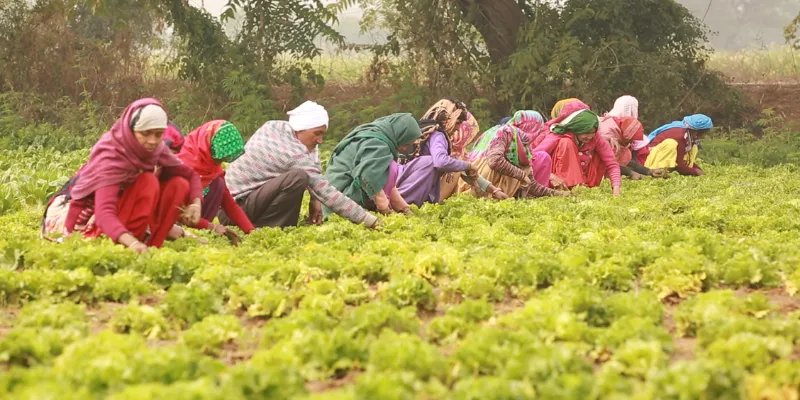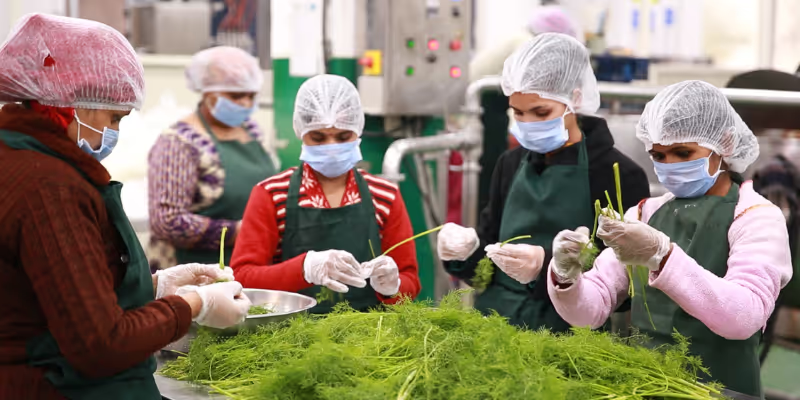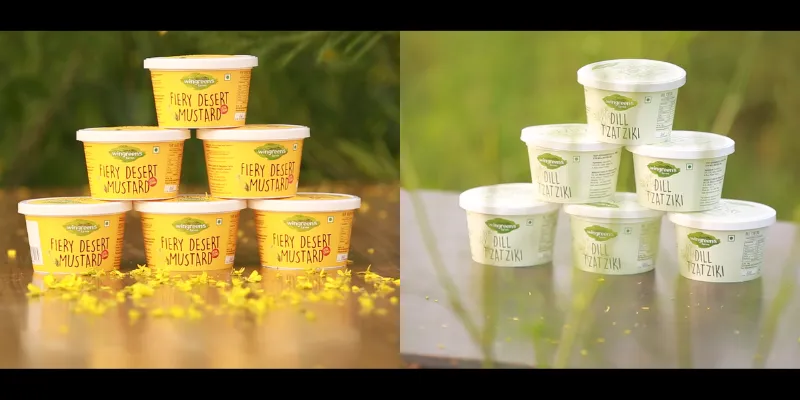How dips and sauces brand Wingreens Farms clocks Rs 8 Cr revenue every month while providing an assured income to farmers
Working with farmers and women in the village of Tauru, Haryana, sauces and dips brand Wingreens Farms has figured a good balance of finding profitability and conducting business with a social impact.

Wingreens Farms, Founder and Managing Director, Anju Srivastava
Anju Srivastava and her husband, Arjun, started Wingreens Farms as Women Initiative Network (WIN) in Gurugram in 2008, with a capital of Rs 10 lakh. Today, this sauces and dips company clocks a revenue of approximately Rs 8 crore every month. But the recipe for their success is not built just on their tasty condiments; the decision to engage farmers and village women in their work paid off.
The journey started when the couple, after working in the US for several years in advertising and marketing, decided to return to India. They were taken aback when they saw the condition of vulnerable farmers in India despite the country predominantly being agrarian.
The idea was to work in the area of farming. The toughest industry in my mind was agriculture but I knew that this is where the need is. I knew nothing about farming but I was determined to learn it,” Anju, Founder and MD, Wingreens Farms tells SMBStory.
A WIN for farmers
Anju wanted to work with farmers who had land but no money. And, her husband, Arjun who is the Founder and Director of the company got actively involved and supported her in this initiative. In 2008, she started growing potted herbs in a half acre farmland that she rented from farmers in Tauru village, Haryana
She grew varieties of basil, thyme, oregano, peppermint, and other herbs for sale. The idea, however, did not pan out, due to the extreme weather conditions in northern India.

Wingreens Farms farmland
WIN continued growing these herbs for a span of three years trying to beat the conditions but in vain.
In 2011, things looked up, when Anju made pesto out of the basil she grew, and approached Spencer’s in MGF Megacity Mall in Gurugram with the product. She recalls,
We approached Spencer’s with a request to let our boys market the pesto sauce by offering people to taste it. The management in Spencer’s was very cooperative and they allowed us to do so. The irony was that we didn’t have pasta to serve along with pesto. Hence, we used chips and showcased pesto as a dip. And, to our surprise, it was received well as a dip, which we never intended as a category.”
From farm to table
Following the successful launch of pesto as a dip, WIN was rebranded as Wingreens Farms, and the company then launched garlic dip. Since then it has managed to evolve enormously, and at present, offers 150 variants in 50 SKUs, including chipotle sauce, fiery desert mustard dip, dill tzatziki, peri peri hummus, rosemary hummus, peppermint with green tea leaves dip, etc.
Each recipe is crafted by Anju herself taking the help of women from the Tauru village to manufacture products.
Now, with the company clocking around Rs 8 crore in revenue every month, Anju says it was an idea waiting to happen. “This was an idea waiting to take off and with our vision to work along with the farmers made it happen,” she adds.
Working with two farmers who are ‘Farm Managers’, and 150 village women, Wingreens manufactures variants in dips, sauces, pita breads, and flatbreads. The company provides its farmers wages of approximately Rs 10,000 per month, which is an assured income for them. Wingreens grows around 150 herbs and crops.
“Farmers have huge farmlands but there is no cash liquidity. We collaborated with them by giving them advances for the farmlands we rented out from them. Earlier, they hardly used to earn Rs 1,000 a month but now they are able to generate more than lakh’s worth of income in a year,” Anju says.
The women, on the other hand, are trained and empowered with financial independence. Right from picking up fresh herbs, to putting in the recipe; these women manufacture all the dips and sauces of Wingreens Farms.

Women employed in Wingreens Farms factory
Now, within a span of eight years, Wingreens Farms has become a sought after brand whose products line the shelves of major supermarkets across the country. The brand has presence in 10,000 stores located in 100 cities across India. Wingreens Farms has a team of 14 food technologists who follow the food testing criteria and supervise quality control.
Doing business, the right way
Wingreens also employs landless labourers in its facility. Additionally, Anju has started a school for the kids in the village. All the women who work in Wingreens Farms send their children to the school, and are able to balance their work and domestic duties as their shifts coincide with the school timings.
“We employ boys who have no degrees in our facility as well. They would otherwise being doing mean jobs. At Wingreens, they work really hard and even get promoted.”
Wingreens’ business model of renting out land and growing crops to manufacture sauces and dips has become a case study and is being studied in Ivey Business School in Canada and in Indian Institute of Management.

Wingreens Farms dips
In 2014, Sequoia Capital invested about $2 million in the company. In 2017, Wingreens raised $3 million in another round of funding from Sequoia for branding the product.
Ingredients that Anju is unable to grow in the farms are sourced from other parts of India.
Future prospects
Talking about the future, Anju reveals that they are planning to work on a 100-acre plot that will help more farmers to earn a sustainable income. For a FMCG brand like theirs, constant experimentation is important. Hence, Wingreens is working towards launching more flavours in the coming years.









